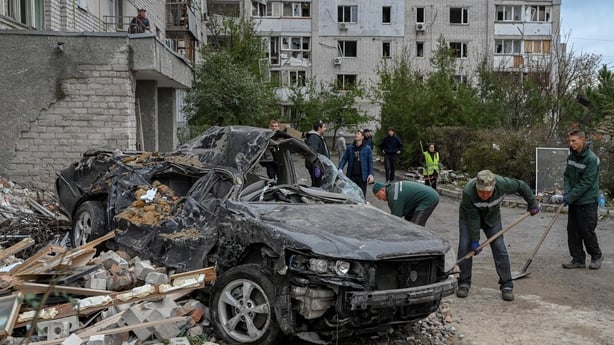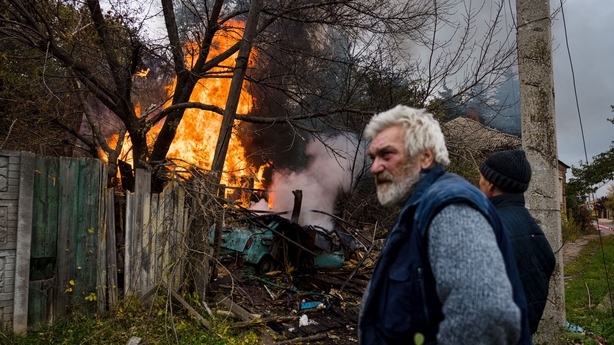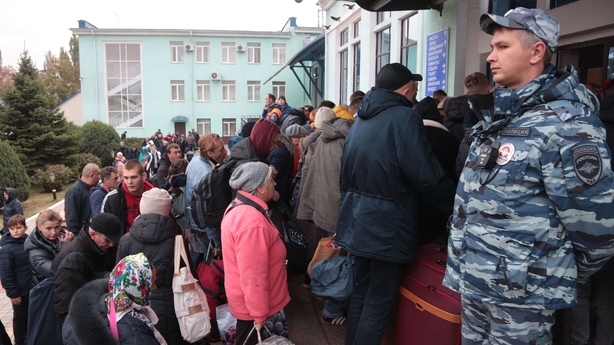German President Frank-Walter Steinmeier was forced to take cover in an air raid shelter during his first visit to Ukraine since Russia's invasion.
The trip came six months after the president, then under heavy criticism for his years-long detente policy with Moscow, was snubbed by Kyiv.
After arriving in the capital, he headed to the northern town of Koriukivka, but was forced to take cover when sirens went off.
"We spent the first hour-and-a-half in an air raid shelter," he said.
"That really impressed upon us the conditions in which people here are living."
Koriukivka was occupied by Russian forces at the start of the war.
Russian troops have since pulled back, but the town is facing a bleak winter due to damaged infrastructure and difficulties with essential supplies.
Mr Steinmeier hailed the courage of the town's residents, who he said had "confronted tanks with their bare hands, and actually brought them to a halt".
The power supply has been partially restored, he said, and a local heating plant will be converted so it can operate with wood harvested locally.
On his arrival earlier in Kyiv, Mr Steinmeier had pledged that Germany will "further support Ukraine: militarily, politically, financially".
He later met President Volodymyr Zelensky in Kyiv and will return to Germany tomorrow.
President Steinmeier's meeting with resident of Koryukivka was forced below ground when the town's air raid siren sounded.
— German Embassy London (@GermanEmbassy) October 25, 2022
In a bunker, people from the town in northern Ukraine gave Steinmeier an insight into their lives during wartime. pic.twitter.com/gBdkQgRj7l
His trip was originally planned for last week. but was cancelled at the last minute due to security reasons, sparking jibes as officials from other countries made the journey.
In the months after Russia invaded Ukraine, Mr Steinmeier, a former foreign minister, was heavily criticised over his years-long rapprochement towards Moscow, which he has since admitted was a mistake.
His offer to visit Kyiv in April was snubbed, sparking tension between the two countries.
Mr Steinmeier, a Social Democrat serving his second stint as German president, was a foreign minister in two of former chancellor Angela Merkel's governments.
He has been a leading advocate of the "Wandel durch Handel" (Change through Trade) concept, which argues that fostering close commercial ties can help spur democratic reforms.
Mr Steinmeier also championed the controversial Nord Stream 2 gas pipeline between Russia and Germany, which has now been halted over Moscow's aggression in Ukraine.
But he has since admitted that his detente approach towards President Vladimir Putin had been misguided, and that there could be "no return to normal with Putin's Russia".
Mr Zelensky, meanwhile, asked the international community to cover an expected budget deficit of $38 billion next year for his war-torn country, in an address via video-link to a reconstruction conference in Berlin.
We need your consent to load this rte-player contentWe use rte-player to manage extra content that can set cookies on your device and collect data about your activity. Please review their details and accept them to load the content.Manage Preferences
Moscow takes 'dirty bomb' claim to UN Security Council
Rebuffed by Western countries, Russia has doubled down on its claim that Kyiv is preparing to use a "dirty bomb" in Ukraine and said it would bring the issue to the UN Security Council today.
Russia sent a letter on its claims about Kyiv to the United Nations late last night, and diplomats said Moscow planned to raise the issue with the Security Council at a closed meeting the following day.
"We will regard the use of the dirty bomb by the Kyiv regime as an act of nuclear terrorism," Russia's UN Ambassador Vassily Nebenzia wrote UN Secretary-General Antonio Guterres and the Security Council in the letter, seen by Reuters.
With Ukrainian forces advancing into Russian-occupied Kherson province, top Russian officials had phoned their Western counterparts on Sunday and yesterday to air their suspicions.
The foreign ministers of France, Britain and the United States rejected Moscow's allegations as "transparently false" and reiterated their support for Ukraine.
"The world would see through any attempt to use this allegation as a pretext for escalation," they said in a joint statement.
Later, the United States issued a warning to Moscow.
"We've been very clear with the Russians ... about the severe consequences that would result from nuclear use," State Department spokesman Ned Price said.
"There would be consequences for Russia whether it uses a dirty bomb or a nuclear bomb."

Russia's defence ministry said the aim of a "dirty bomb" attack by Ukraine would be to blame Russia for the resulting radioactive contamination. The ministry has begun preparing for such a scenario, it said, readying forces and resources "to perform tasks in conditions of radioactive contamination".
The UN nuclear watchdog said yesterday that it was preparing to send inspectors in the coming days to two Ukrainian sites at Kyiv's request, in an apparent reaction to the Russian "dirty bomb" claims. It said both sites were already subject to its inspections and one was inspected a month ago.
Russia's state news agency RIA had earlier identified what it said were the two sites involved in the operation -- the Eastern Mineral Enrichment Plant in central Dnipropetrovsk region and the Institute for Nuclear Research in Kyiv. The IAEA statement did not name the facilities it would inspect.
US officials said there was no indication Moscow had made the decision to use a dirty bomb or any nuclear weapon.
"We continue to see nothing in the way of preparations by the Russian side for the use of nuclear weapons," White House national security spokesman John Kirby told reporters.

Mr Zelensky said the Russian accusation was a sign Moscow was planning such an attack itself and would blame Ukraine.
"If Russia calls and says that Ukraine is allegedly preparing something, it means one thing: Russia has already prepared all this," Mr Zelensky said in an overnight address.
It comes as six people, including a child, were injured in a blast in the Russian-held city of Melitopol in southern Ukraine, the pro-Moscow administration said.
Andrei Zhidkov, head of the Russian-controlled city police, said a car loaded with homemade explosives blew up outside a local media company, wounding six civilians, including a 12-year-old.
Mr Zhidkov put the blame on authorities in Kyiv and said an investigation has been launched.
"The actions of the Kyiv regime were once again aimed against the civilian population," Zhidkov said in a statement on Telegram.
Earlier in the day, local officials had said that five people received minor injuries in the blast and one was hospitalised.
Photos showed a grey building block with windows ripped off, burning debris on the ground.
The Telegram channel of the Ukrainian administration in exile showed photos from an explosion.
"This is what the heating in the buildings of collaborationists and propagandists should look like! And it will become hotter" the Ukrainian administration said Tuesday.
The television and radio studio are continuing their work, the pro-Moscow administration said on Telegram.
Ukrainian foreign minister Dmytro Kuleba said last night that he had a detailed discussion with US Secretary of State Antony Blinken on "ways to end Russia's nuclear blackmail".

Refugees warned not to return to Ukraine
Deputy Prime Minister Iryna Vereshchuk has told Ukrainians currently sheltering abroad that they should wait until spring before returning home.
"I wanted to ask (them) not to return. We need to survive the winter," she said.
Since 10 October, Russia has launched waves of missile and drone strikes targeting Ukraine's energy infrastructure. Kyiv says they have damaged up to 40% of the power system.
A local official in Kyiv, the capital, warned last week that residents needed to be prepared for possible disconnections lasting days or even weeks.
The strikes on Ukraine's infrastructure come against a backdrop of soaring energy, food and other prices in Europe, where most of the millions of refugees who fled Russia's invasion have sought shelter.
Ms Vereshchuk said the grid "won't survive" the return of refugees from abroad, and that the situation would "only get worse".
"To return now is to risk yourself and your children, your vulnerable relatives," she said
This poses a problem for refugees, many of whom have struggled to find well-paid, permanent jobs in their new countries of residence.
Evacuation
Russia has ordered civilians to evacuate territory it controls on the western bank of the Dnipro River, where Ukrainian forces have been advancing this month shortly after Moscow claimed to have annexed the area.
A Russian defeat there would be one of Moscow's biggest setbacks yet since its invasion eight months ago.
Kherson's regional capital is the only big city Russia has captured intact since its 24 February invasion, and its only foothold on the west bank of the Dnipro, which bisects Ukraine.
The province controls the gateway to Crimea, the peninsula Russia seized and claimed to annex in 2014.
The Russian-installed authorities in Kherson announced yesterday that men who stay behind would have the option of joining a military self-defence unit. Kyiv accuses Russia of press-ganging men in occupied areas into military formations, a war crime under the Geneva Conventions.
Kyrylo Budanov, Ukraine's military spy chief, said Russian forces were preparing to defend Kherson city, not retreat.
"They are creating the illusion that all is lost. Yet at the same time they are moving new military units in and preparing to defend the streets of Kherson," he told the Ukrainska Pravda online media outlet.
Since Russia's forces suffered major battlefield defeats in September, President Vladimir Putin has escalated the war, calling up hundreds of thousands of reservists, announcing the annexation of occupied territory and repeatedly threatening to use nuclear weapons to defend Russian land.
This month, Russia started a new campaign using long-range cruise missiles and Iranian-made drones to attack Ukraine's energy infrastructure before winter sets in.

